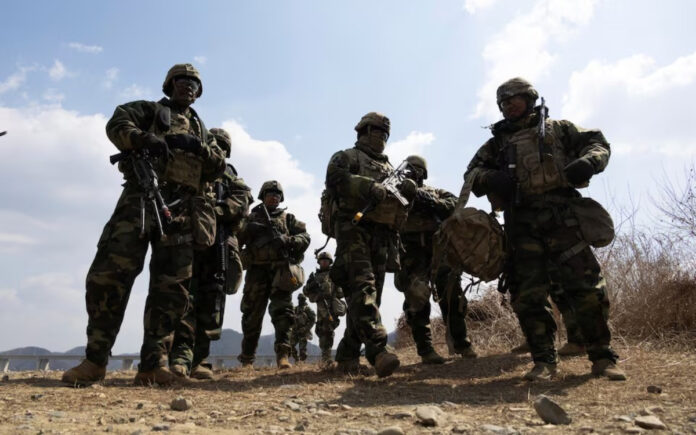Seoul: South Korea’s Ministry of National Defense has firmly denied media reports suggesting that Seoul and Washington are engaged in talks about withdrawing U.S. troops from the Korean Peninsula.
The statement comes in response to a Wall Street Journal report claiming that the United States is considering relocating approximately 4,500 of the 28,500 American troops currently stationed in South Korea. The report, citing unnamed U.S. military officials, indicated that one option being reviewed involves moving a portion of the forces to other strategic locations in the Indo-Pacific region, such as Guam.
In a formal response issued on Friday, South Korea’s defense ministry clarified, “No such discussions have taken place between Seoul and Washington.” The ministry emphasized that the U.S. troop presence remains critical to maintaining deterrence against North Korea and reaffirmed that the allies continue to closely cooperate.
“South Korea will continue its cooperation with the United States to maintain a strong combined defence posture in order to deter North Korea,” the statement read.
Also Read | Surge in Chinese Imports Helps Australia Manage Inflation
The alliance between the U.S. and South Korea remains foundational to security in the region, particularly in light of persistent threats from Pyongyang’s nuclear ambitions.
Currently, the two nations are operating under a five-year bilateral defense cost-sharing agreement established in 2023. However, during his presidency, Donald Trump repeatedly suggested that the financial terms of the U.S. military presence could be subject to renegotiation, potentially linking defense contributions to broader trade discussions.
Also Read | Disney Sues to Block YouTube’s Appointment of Former Executive to Lead Sports and Media
Despite this, South Korean officials have consistently maintained that defense cost-sharing should remain separate from trade negotiations, particularly as Seoul works to lift tariffs impacting its key export sectors.
The debate over troop presence unfolds as South Korea prepares for a snap presidential election on June 3. The upcoming vote follows a period of political instability that has left a temporary leadership void, complicating the country’s efforts to secure favorable trade terms and navigate regional security challenges.



